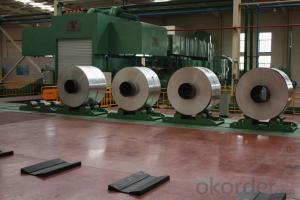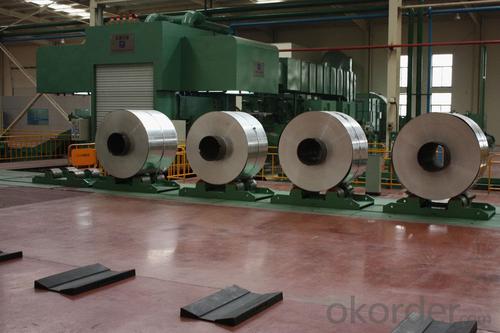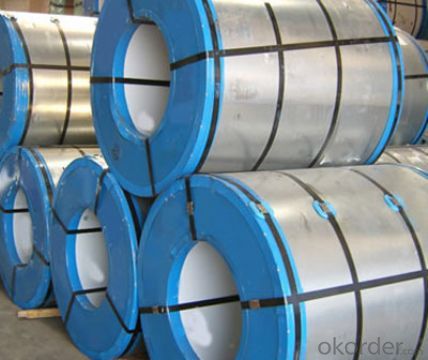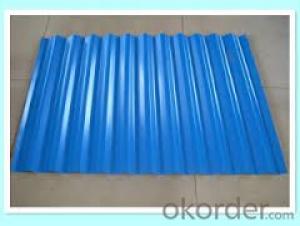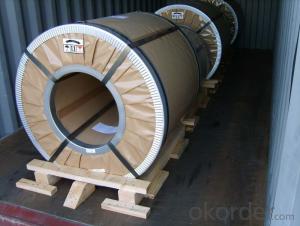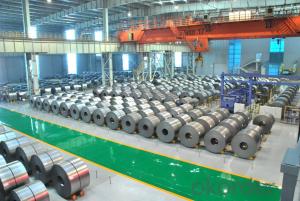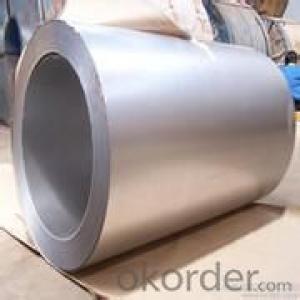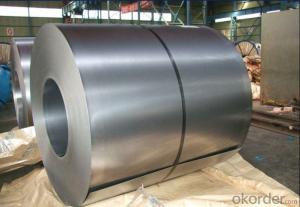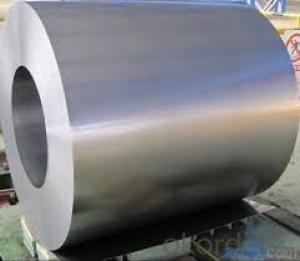SPCC cold rolled steel coil CRC high quality
- Loading Port:
- Tianjin
- Payment Terms:
- TT OR LC
- Min Order Qty:
- 50 m.t.
- Supply Capability:
- 10000 m.t./month
OKorder Service Pledge
OKorder Financial Service
You Might Also Like
SPCC cold rolled steel coil
Product Description :
CRC cold rolled steel coil
1.Standard | JIS, DIN, ASTM |
2.Grade | SPCC DC01 ST12 SAE1008 For more grades,please contact us. |
3.Thickness | 0.4mm-2mm |
4.Width | 1,000mm, 1,200mm, 1,250mm |
5.Place of origin | China |
6.Brand | HUAYE |
7.Model | DC01 |
8.Type | Steel coil and Sheet |
9.Technique | Cold rolled |
10.coil weight | 3tonn-15ton |
11.Application | Constructions, white appliance manufacturing, etc |
COLD ROLLED STEEL COIL
THICKNESS: 0.20mm-1.8mm
WIDTH:1000mm-1250mm
SURFACE: BRIGHT ANNEALED, CUTTING EDGE, MATT FINISH
STANDARD:JIS G 3141 SPCC
COIL ID: 508mm/610mm
COIL WEIGHT:5-10 ton
PACKAGE: COIL TO BE WRAPPED WITH ANTI-RUST PAPER PLUS METAL COVER WORTHY FOR SEA TRANSPORTATION
TERMS OF PAYMENT: 20% ADVANCED PAYMENT BEFORE PRODUCTION,SELLER RELEASE THE SHIPPING DOCUMENTS AFTER RECEIPT BUYER’S 80% PAYMENT
LABEL INFORMATION:As per customer's request.
Our advantage :
1. Expertise:
10 years of manufacture: we know how to properly handle every step of production.
2. Competitive price:
We produce resin and paint by ourself, which greatly reduce our cost!
3. Accuracy:
We have a technician team of 40 people and a QC team of 30 poeple, ensure our products is exactly what you want.
4. Materials:
All color Steel Sheets are made of high-quality raw materials.
5.Certificate:
Our products are certified by TUV, ISO9001:2008,ISO14001:2004 etc.
6. Productivity:
We have three large-scale production line, to guarantee all your orders will be finished in earlist time
- Q: What metals contain steel? It can be anything except soft iron or steel.
- Metals do not contain steel. Steel is an alloy of purified iron and carbon, and sometimes with other metals, such as nickel, chromium, or molybdenum to make it stainless or to change its hardness or other properties. It's like asking what cereals contain Cheerios. It doesn't really make sense. Other metal alloys contain iron, which is an element and the main ingredient of steel. Maybe you should be asking which metal alloys contain iron? That's more like asking which cereals contain whole grain oats. Now that's a question that can be answered by reading the ingredients labels on your standard boxes of metal alloys :-)
- Q: Is steel with a black coloring as strong as regular steel. if you are asking why i have two wordsBlack Katana.I know a katana is not made with normal steel, it is made of two types with varying grades of carbon to give it speacial properties, i just want to know if the black will make a difference.
- The term tensile potential refers back to the quantity of tensile (stretching) rigidity a textile can stand up to in the previous breaking or failing. the in simple terms suitable tensile potential of a textile is calculated by making use of dividing the element of the textile examined (the pass area) by making use of the strain located on the textile, regularly expressed in terms of pounds or much consistent with sq. inch of fabric. Tensile potential is an considerable degree of a textile's skill to accomplish in an utility, and the scale is extensively used whilst describing the residences of metals and alloys.
- Q: What are the different types of steel coil loading and unloading methods?
- There are several types of steel coil loading and unloading methods, including coil cradle loading, coil trailer loading, coil car loading, coil transfer by crane, and coil transfer by forklift. Each method has its own advantages and is used based on the specific requirements and capabilities of the loading and unloading equipment.
- Q: What are the different types of steel finishes available for coils?
- There are several types of steel finishes available for coils, including hot rolled, cold rolled, galvanized, and stainless steel. Hot rolled steel has a rough surface and is often used for structural applications. Cold rolled steel has a smoother surface and is commonly used in appliances and automotive parts. Galvanized steel has a protective zinc coating to prevent corrosion and is used in outdoor applications. Stainless steel is resistant to corrosion and staining, making it suitable for food processing and medical equipment.
- Q: I need to know how you rate the hardness of steel any ideas?
- Find your portable hardness testers from our latest collections thats for sure having the ability to test hardness of metal alloys and plastic by applying some amount of pressure on it. All our evaluators can evaluate in Brinell, Rockwell and Vickers machines.
- Q: I'm just wondering what the best steel would be for an edc/hunting knife that could put up with alot of abuse.
- D2 and O2 steels are nice. They are expensive, but hold an edge extremely well. S30V is nice also. It's a more stain-resistant steel that holds an edge very well. For outdoor hiking/camping knives, it's tough to beat good old 1095 carbon steel. Sure it will rust, but it's tough as nails, not brittle, holds an edge pretty well, and easy to sharpen...and it's pretty cheap. Other steels, AUS8 is an ok cheap steel. It's stain resistant and cheap. AUS6 isn't worth the time or effort. Buck knives does an excellent job of heat treating 420 stainless to become very hard. Their knives are excellent considering 420 stainless is typically soft steel.
- Q: What are the different methods of coil recoiling for steel coils?
- Steel coils can undergo coil recoiling using various methods, each with its own advantages and applications. Some commonly used methods include: 1. Slitting and rewinding: This method entails cutting the wide steel coil into narrower strips, which are then rewound into smaller coils. Circular blade slitting machines are typically employed for steel cutting, while the rewinding process ensures tight and uniform winding of the narrower strips. Industries like automotive, construction, and packaging widely employ this method. 2. Rewinding with tension control: This method involves unwinding and rewinding the steel coil using tension control systems. These systems maintain consistent tension throughout the recoiling process, resulting in uniform winding quality. This method proves beneficial when handling delicate or sensitive materials that require gentle treatment. 3. Recoiling with edge trimming: In situations where steel coil edges are damaged, uneven, or flawed, edge trimming can be combined with the recoiling process. Edge trimming machines remove defective sections, ensuring coils with smooth and even edges. 4. Recoiling with surface treatment: Steel coils often undergo surface treatment processes like oiling, coating, or galvanizing to enhance corrosion resistance or improve surface properties. Recoiling can be performed alongside these treatments, guaranteeing proper application and uniform coverage across the entire coil surface. 5. Recoiling with tension leveling: Tension leveling is a process that eliminates coil shape defects, such as coil set or crossbow, by applying tension during recoiling. This method ensures a flat and even coil shape, which is advantageous for subsequent processing and manufacturing operations. 6. Recoiling with precision slitting: Precision slitting is a specialized method used to achieve extremely narrow strip widths or tight tolerances in the steel coil. It involves precise control of slitting knives and winding tension to ensure accurate and consistent strip dimensions. Industries requiring high precision, such as electronics or precision engineering, commonly employ this method. In summary, the choice of coil recoiling method depends on factors such as desired coil dimensions, material characteristics, surface requirements, and the specific industry or application. Manufacturers often combine multiple methods to meet the diverse needs of their customers.
- Q: How are steel coils tested for strength and durability?
- Steel coils are tested for strength and durability through various methods such as tensile testing, impact testing, and fatigue testing. Tensile testing involves subjecting the steel coil to tension until it breaks, measuring the maximum force it can withstand. Impact testing involves striking the coil with a heavy object to assess its ability to resist sudden shocks. Fatigue testing involves subjecting the coil to repeated load cycles to determine its resistance to long-term stress. These tests help ensure that steel coils meet the required strength and durability standards.
- Q: What's the best way to clean granite countertops and stainless steel appliances? My countertops especially always look dull and streaky. Thanks!!!!!!!
- Stainless steel kitchen appliances look best when they're clean and shiny. To clean tough stains and cooking grease, and give them a dazzling shine, try the same detergent you would use when washing the dishes. One formulated to cut grease works especially well.This also works well for general kitchen cleaning.Waterless hand soap also works great as a polish, simply rub on, and polish - no rinsing. :) Don't use an ordinary kitchen cleaning product to clean granite. The newest technology uses peroxide and detergents to penetrate soiled areas. Simply spray a product such as Bio-OX Citrus Concentrate on the soiled area, allow it to penetrate for a few minutes, then wipe clean. Baking soda can be sprinkled on for a more abrasive cleaning action. Repeat if necessary. Granite can also be cleaned using warm, sudsy water (a mild detergent such as a grease cutting dish detergent or laundry detergent is fine) or a solution of borax and water. Thoroughly rinse and buff dry. To remove stains from granite, make a paste of baking soda and hydrogen peroxide or baking soda and Bio-OX Citrus Concentrate and cover the stain with the paste. Cover the paste with a damp cloth, leave overnight, then wet down and scrub with a nonmetallic scrubbing pad. Rinse thoroughly with clean water. Wipe up any spills as they happen so they don't soak in, and always dry coutertops after washing the dishes.
- Q: Can one assume that stainless steel that can be hardened is magnetic?
- All steels are hardenable if you use the right process. Most stainless steels are magnetic but usually more weakly than mild steel.
Send your message to us
SPCC cold rolled steel coil CRC high quality
- Loading Port:
- Tianjin
- Payment Terms:
- TT OR LC
- Min Order Qty:
- 50 m.t.
- Supply Capability:
- 10000 m.t./month
OKorder Service Pledge
OKorder Financial Service
Similar products
Hot products
Hot Searches
Related keywords
